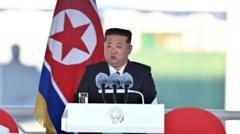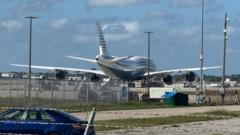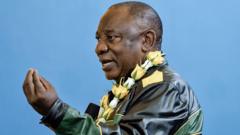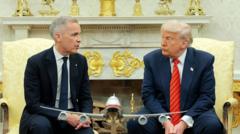The recent acceptance of a Boeing 747 intended for the Air Force One fleet from Qatar has sparked controversy. Critics, including some of Trump's supporters, voice concerns regarding the legality and appropriateness of such a gift, raising questions about foreign influence and national security.**
Controversy Erupts Over Qatar's Gift of Aircraft for Air Force One Fleet**
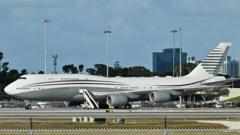
Controversy Erupts Over Qatar's Gift of Aircraft for Air Force One Fleet**
The U.S. accepts a Boeing 747 from Qatar, raising questions about legality, implications, and potential security risks amid bipartisan criticism.**
The U.S. government has officially accepted a Boeing 747 from Qatar intended for the Air Force One fleet, a decision that has led to widespread criticism, including from some of President Trump's staunch supporters. Chief Pentagon spokesperson Sean Parnell confirmed the acceptance, stating that it complies with all federal regulations. However, the announcement of the plane’s transfer, which is valued at approximately $400 million, has stirred controversy due to its nature as a gift from the Qatari royal family.
While the White House maintains that the transaction is legal, critics argue it could violate the Emoluments Clause of the U.S. Constitution, which prohibits public officials from receiving gifts from foreign governments without congressional approval. Despite this, Trump has defended the deal, claiming it represents a straightforward gesture of goodwill from an ally. He emphasized that the aircraft would ultimately become part of his presidential library after his term.
Retrofitting the aircraft to meet the security protocols required of Air Force One may cost upwards of $1 billion and could take years, according to defense experts. Trump has expressed frustration with Boeing, which has been contracted to provide a newer model of Air Force One. He addressed the recent transfer on Truth Social, stressing its transparency and asserting that it is a transaction between the defense departments of both nations.
Qatar’s Prime Minister, Sheikh Mohammed bin Abdulrahman bin Jassim Al-Thani, defended the gift as a governmental exchange devoid of personal motivations. Nevertheless, several Republican senators, including Rand Paul and Ted Cruz, have voiced their unease regarding the implications of such a sizeable gift. Concerns range from the appearance of impropriety to the potential threats posed by foreign surveillance capabilities associated with the aircraft.
As this scenario unfolds, questions linger about the ethical considerations and security implications surrounding the acceptance of a $400 million luxury airplane, reflecting the complex relationship between the U.S. and Qatar amid broader discussions about foreign influence in American politics.




